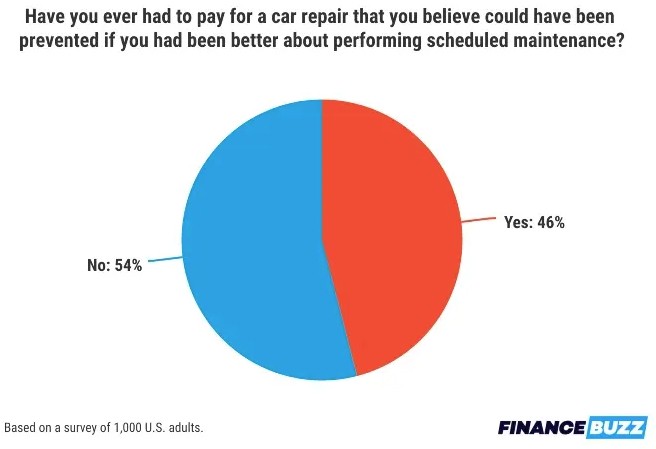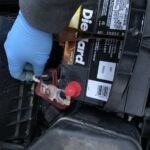It’s a scenario many car owners dread: the sudden, unexpected car repair. But a recent survey of 1,000 U.S. drivers reveals a deeper issue than just surprise bills. FinanceBuzz’s comprehensive study uncovers how much people are actually paying for car repairs, and more importantly, the hidden costs they incur by delaying essential maintenance. The findings expose a worrying trend of postponed upkeep, inaccurate cost estimations, and a significant number of drivers financially unprepared for vehicle emergencies. Let’s dive into the key revelations and what they mean for your wallet and your wheels.
The Price of Procrastination: Delayed Maintenance Leads to Costlier Repairs
The survey data paints a clear picture: putting off car maintenance is a widespread habit with expensive consequences. A staggering 46% of drivers admitted to paying for car repairs they believe could have been avoided with timely scheduled maintenance. This highlights a critical disconnect between knowing the importance of upkeep and actually prioritizing it. The allure of saving money in the short term by skipping an oil change or ignoring a funny noise often backfires, leading to larger, more complex, and ultimately more expensive repairs down the road.
This isn’t just speculation; it’s a recognized pattern by car owners themselves. The survey underscores the financial repercussions of neglecting routine car care, suggesting that preventative maintenance isn’t just about extending vehicle life, it’s also a crucial strategy for managing car repair expenses.
The Majority are Driving with Known Issues: Are You One of Them?
Despite acknowledging the pitfalls of delayed maintenance, a significant 69% of drivers confessed to postponing necessary car servicing even when they knew it was due. This reveals a potential gap between understanding and action, possibly driven by financial anxieties, time constraints, or simply wishful thinking that the problem will resolve itself. Even more concerning, 64% of respondents reported currently driving a vehicle with a known maintenance need they are actively putting off. This widespread procrastination means a large portion of vehicles on the road are operating in less than optimal condition, potentially compromising safety and definitely increasing the risk of future breakdowns.
The survey breaks down the most commonly deferred maintenance tasks, revealing that over a quarter (28%) of drivers are delaying oil changes. While seemingly minor, neglecting oil changes can lead to engine damage over time. More worryingly, 17% are driving on worn tires, a serious safety hazard, and another 17% are ignoring the dreaded “check engine” light, which could signal a range of issues from minor sensor malfunctions to major engine problems. Additionally, 16% are aware of wheel alignment or brake inspection needs, and 15% are driving with cracked windshields, further highlighting a concerning trend of neglecting essential safety and maintenance aspects.
The survey also investigated the duration of these delays. While 31% of drivers address car issues promptly, a concerning 43% take up to two weeks to schedule repairs after becoming aware of a problem. Alarmingly, over a quarter (26%) wait two weeks or longer, with 14% delaying repairs for a month or more. This extended period of neglect can exacerbate minor issues into major, costly repairs.
Money Matters Most: Why Financial Concerns Drive Delayed Repairs
So, why are so many drivers knowingly delaying crucial car maintenance and repairs, even when they understand the potential for increased costs? The survey points to a straightforward answer: financial constraints. When asked about their capacity to handle an emergency car repair bill, a striking 58% of drivers stated they could not afford to pay more than $1,000 for an unexpected repair right now. Within this group, a third (33%) are even more financially vulnerable, unable to manage a repair bill exceeding $500.
This financial fragility explains why many drivers might postpone car maintenance and repairs as long as possible. The fear of a significant repair bill looms large, leading to a gamble where drivers hope to avoid immediate expenses, potentially at the cost of larger bills in the future. This highlights the significant financial pressure many car owners face and how it directly impacts their car maintenance decisions.
Reality vs. Perception: The Underestimated Cost of Car Repairs
Adding to the problem is a widespread underestimation of actual car repair costs. The survey revealed that drivers often have inaccurate perceptions of how much common repairs truly cost, which can lead to sticker shock and further financial strain when repairs become unavoidable.
A significant 76% of drivers underestimated the cost of transmission repairs, with the median estimate being only half of the actual low-end cost. Furthermore, 43% underestimated brake replacement costs, and over half (53%) underestimated engine replacement expenses. This lack of accurate cost awareness can make drivers less prepared for necessary repairs, contributing to the cycle of delayed maintenance and potential financial hardship.
In conclusion, the survey data from FinanceBuzz provides crucial insights into how much people are actually paying for car repairs, both directly and indirectly. It’s not just about the immediate cost of a service; it’s about the accumulated expenses from neglecting maintenance and misjudging repair budgets. Understanding these trends is the first step towards breaking the cycle of delayed maintenance, managing car repair costs effectively, and ensuring vehicle safety and longevity. For more information on car maintenance schedules and repair cost estimations, resources like Car Repair Online can be invaluable in empowering car owners to make informed decisions and avoid costly surprises.


